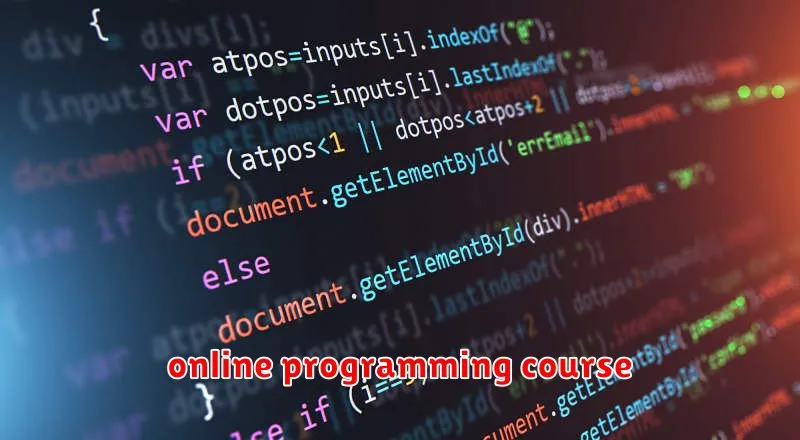Are you looking to level up your coding skills and open doors to exciting career opportunities? The world of technology is constantly evolving, and staying ahead of the curve requires continuous learning. Fortunately, the internet provides a vast array of resources to boost your programming knowledge, from interactive tutorials to comprehensive bootcamps. In this article, we’ll delve into the best online programming courses, helping you choose the perfect fit for your learning style and goals. Whether you’re a complete beginner or a seasoned developer, there’s a course out there that can help you master new languages, frameworks, and technologies.
Online learning offers unparalleled flexibility and accessibility. You can study at your own pace, on your own schedule, and from the comfort of your home. No matter what your budget or time constraints, there are affordable and time-efficient options available. With the right resources, you can acquire valuable skills that will enhance your career prospects and open doors to a world of possibilities. Let’s explore the best online programming courses and discover how they can help you unlock your full potential!
Why Learn Programming in Today’s World?

In the digital age, programming skills are becoming increasingly valuable. Whether you’re looking to advance your career, pursue a new passion, or simply stay relevant in a rapidly evolving world, learning to code is an excellent investment.
Here are just a few reasons why learning programming is so essential in today’s world:
- High Demand and Excellent Job Prospects: The demand for skilled programmers continues to surge across industries, from software development to data science and beyond. Learning programming opens doors to a wide range of exciting career opportunities with competitive salaries.
- Problem-Solving and Critical Thinking Skills: Programming involves breaking down complex problems into smaller, manageable steps. It sharpens your logic, analytical thinking, and problem-solving abilities, skills that are valuable in any profession.
- Automation and Efficiency: Programming empowers you to automate repetitive tasks and create tools that streamline processes, boosting productivity and saving time.
- Innovation and Creativity: Programming allows you to bring your ideas to life. You can build websites, apps, games, and more, unleashing your creativity and contributing to the digital landscape.
- Global Connectivity and Collaboration: Programming fosters a global community of learners and developers, connecting you with a vast network of like-minded individuals.
Learning programming is no longer just for computer scientists or tech enthusiasts. It’s a skill that empowers individuals in all walks of life. With the right resources and dedication, anyone can embark on this exciting journey and unlock a world of possibilities.
Choosing the Right Programming Language for You

Choosing the right programming language can be daunting, especially with so many options available. The key is to understand your goals and interests. Ask yourself: What kind of applications do you want to build? What platforms do you want to target? Do you want to work with data, build websites, or create mobile apps?
For example, if you’re interested in web development, JavaScript is a great starting point. It’s used for both front-end (what users see) and back-end (server-side) development. Python is another popular choice, known for its simplicity and versatility, making it ideal for data science, machine learning, and web development. If you’re passionate about mobile app development, Swift (for iOS) and Kotlin (for Android) are excellent options.
Remember, there’s no single “best” language. It’s all about finding the one that aligns with your goals and interests. Don’t be afraid to explore different languages and experiment until you find the one that excites you the most.
Top Online Platforms for Programming Courses
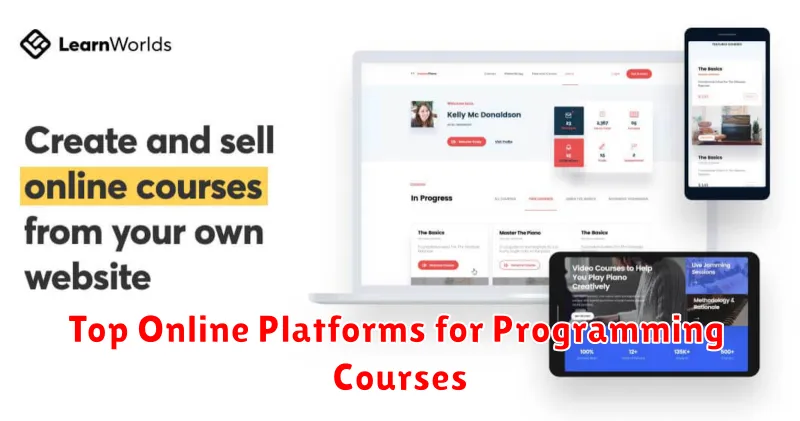
In today’s digital age, programming skills are highly sought after, opening doors to exciting career opportunities. If you’re looking to level up your coding skills, numerous online platforms offer comprehensive and engaging courses. Here are some of the best platforms to consider:
1. Coursera
Coursera boasts a vast library of courses from top universities and institutions worldwide. It offers a diverse range of programming languages, from Python and Java to C++ and Swift. You can find both introductory and advanced courses, catering to all levels of expertise. Coursera’s courses are designed to be interactive and engaging, with video lectures, quizzes, and hands-on projects.
2. edX
Similar to Coursera, edX partners with renowned universities and organizations to deliver high-quality online learning experiences. Their programming courses cover various disciplines, including data science, web development, and machine learning. edX offers a flexible learning environment, allowing you to study at your own pace and choose from different course formats, such as self-paced, guided, and live.
3. Udemy
Udemy is a popular platform known for its extensive collection of courses on various subjects, including programming. You’ll find a wide range of options from beginner-friendly introductions to advanced concepts. Udemy’s courses are typically taught by industry experts, providing practical insights and real-world applications. The platform’s frequent discounts and promotions make it an affordable choice for aspiring programmers.
4. Codecademy
Codecademy specializes in interactive coding courses, making it an ideal choice for hands-on learning. It offers a comprehensive curriculum covering popular languages like Python, JavaScript, and SQL. Codecademy’s intuitive interface and gamified approach make learning enjoyable and engaging. It’s particularly well-suited for beginners who want to develop foundational programming skills.
5. FreeCodeCamp
FreeCodeCamp stands out for its completely free, comprehensive curriculum. This non-profit organization offers a self-paced, project-based learning experience, allowing you to build real-world projects while learning essential programming concepts. FreeCodeCamp’s interactive lessons, coding challenges, and supportive community make it a valuable resource for aspiring developers.
Choosing the right online platform for your programming journey depends on your individual learning style, goals, and budget. Explore these platforms, sample their courses, and find the best fit for your needs. With dedication and the right resources, you can master the art of programming and unlock a world of possibilities.
Key Features of Effective Programming Courses
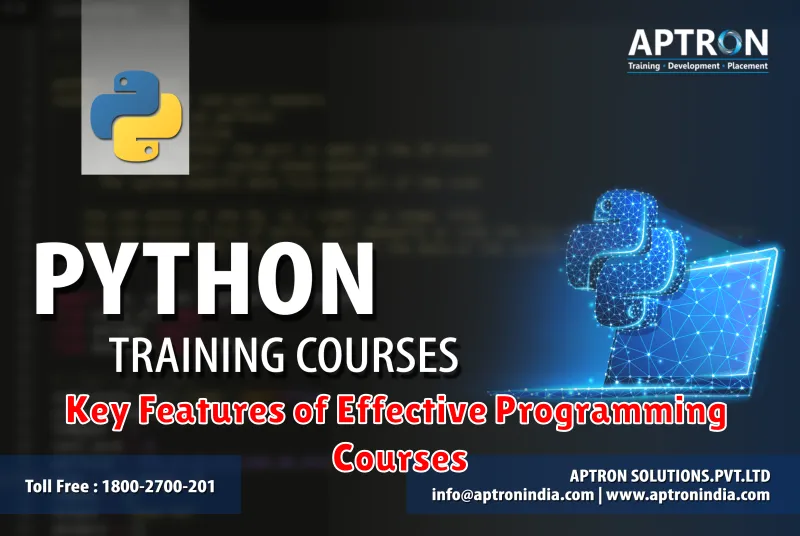
Navigating the world of online programming courses can be overwhelming. With so many options available, it’s crucial to identify courses that deliver real value and effectively equip you with the skills you need. Here are some key features to look for when choosing an effective programming course:
Comprehensive Curriculum: A robust curriculum is the cornerstone of a successful programming course. Look for courses that cover a wide range of essential topics, including fundamentals like data structures and algorithms, as well as practical applications and industry-relevant frameworks. A well-structured curriculum ensures you gain a solid understanding of programming concepts and develop practical skills.
Hands-on Projects: Theory is important, but practical application is key to mastering programming. Effective courses prioritize hands-on projects that allow you to implement your learning and build real-world experience. Projects provide valuable opportunities to apply concepts, troubleshoot problems, and develop your problem-solving abilities.
Experienced Instructors: Learning from knowledgeable and experienced instructors is vital for success. Look for courses taught by industry professionals who have real-world experience and can provide valuable insights and guidance. Experienced instructors can effectively explain complex concepts, answer your questions, and provide feedback on your projects.
Supportive Community: A supportive learning community can make all the difference. Look for courses that offer forums, chat groups, or other channels where you can connect with fellow learners and instructors. This community can provide peer support, answer questions, and foster a collaborative learning environment.
Interactive Learning: Interactive learning methods can significantly enhance your understanding and engagement. Look for courses that incorporate quizzes, coding challenges, simulations, and other interactive elements. These methods help reinforce concepts, test your knowledge, and provide immediate feedback.
Industry-Relevant Skills: The goal of a programming course should be to equip you with in-demand skills that are valued by employers. Look for courses that cover industry-standard languages, frameworks, and tools. This ensures your skills are relevant and marketable in the job market.
By considering these key features, you can identify effective programming courses that will help you level up your skills and achieve your career goals. Remember, choosing the right course can make all the difference in your learning journey.
Exploring Different Learning Styles and Preferences
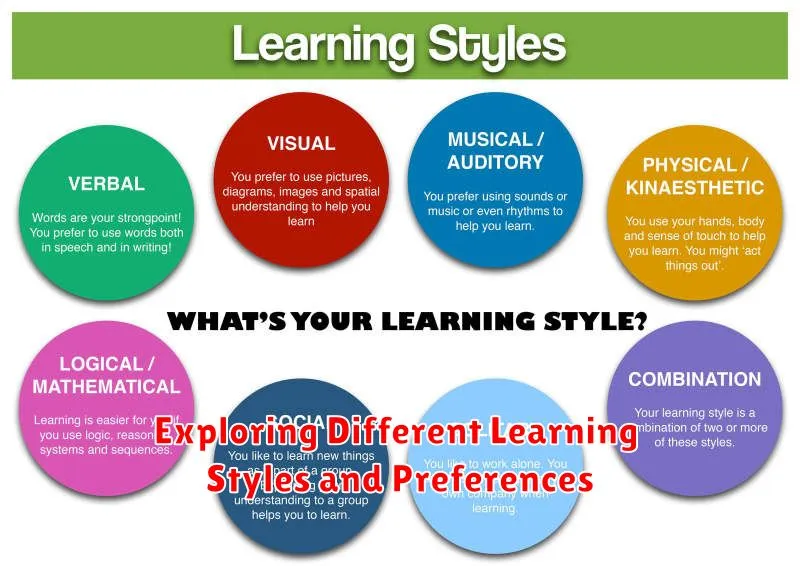
Everyone learns differently, and this is especially true in the world of programming. Whether you prefer hands-on coding, visual learning, or a combination of both, there’s a learning style and preference that’s perfect for you.
Visual Learners: Visual learners thrive on seeing things in action. Look for courses that utilize diagrams, animations, and interactive visualizations to explain concepts. Platforms like Khan Academy and Codecademy often incorporate these elements.
Auditory Learners: If you prefer listening to learn, podcasts, video tutorials, and courses with clear audio explanations are your best bet. Platforms like Udemy and Coursera offer a wide variety of these options.
Kinesthetic Learners: Kinesthetic learners learn best through hands-on experiences. Look for courses that emphasize coding challenges, projects, and building real-world applications. Platforms like freeCodeCamp and HackerRank are great for this type of learning.
Read/Write Learners: If you’re a strong reader, you might enjoy learning from detailed text-based resources, such as online articles, books, and documentation. Many programming communities offer comprehensive guides and tutorials for free.
Ultimately, the best way to learn programming is to find a method that resonates with your individual style and preferences. Experiment with different courses, platforms, and learning materials until you discover what works best for you.
Free vs. Paid Programming Courses: Making the Right Choice
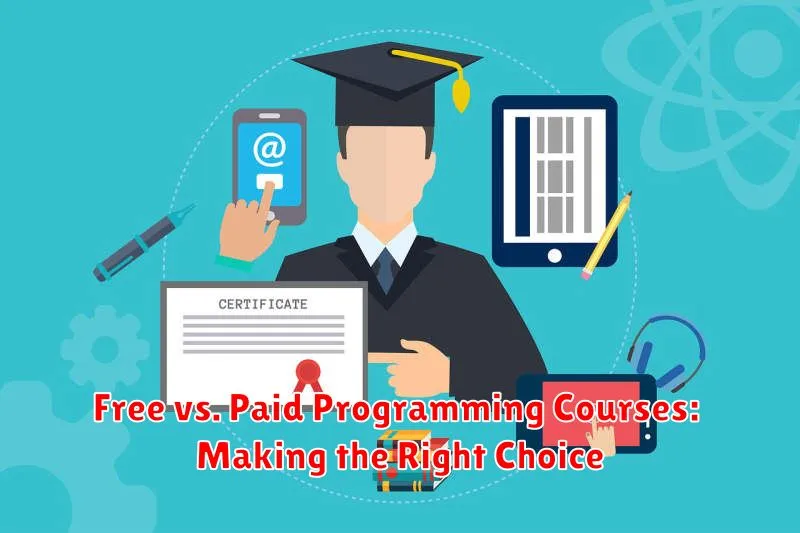
Embarking on a programming journey can be both exciting and daunting. With a vast array of online courses available, choosing the right path can feel overwhelming. One crucial decision you’ll face is whether to opt for free or paid courses.
Free programming courses offer a great starting point for beginners. Platforms like Khan Academy, Codecademy, and freeCodeCamp provide accessible, interactive lessons, covering fundamental concepts and popular languages. They’re ideal for exploring different areas, testing your interest, and building a foundational understanding. However, they may lack the structured curriculum, comprehensive support, and personalized guidance found in paid courses.
Paid programming courses, on the other hand, often deliver a more structured and in-depth learning experience. They typically feature comprehensive curriculum, interactive exercises, project-based learning, and expert instructors who provide feedback and support. Platforms like Udemy, Coursera, and Udacity offer a wide range of paid courses, catering to various skill levels and programming languages. The cost factor is a significant consideration, but the potential for personalized learning, career guidance, and certification can be invaluable.
Ultimately, the best choice depends on your individual circumstances, learning style, and goals. If you’re new to programming, starting with a free course can be a great way to get your feet wet. However, if you’re serious about pursuing a career in programming or need more structured learning, paid courses can provide a significant advantage.
Essential Skills Covered in Top Programming Courses
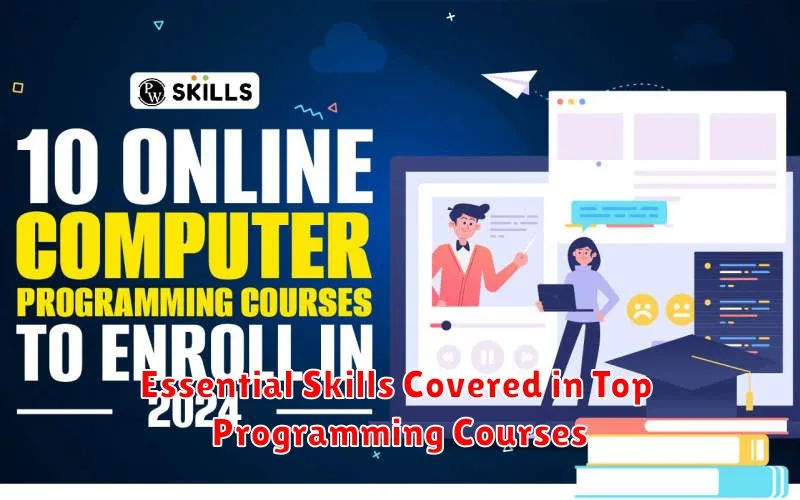
Top programming courses are designed to equip you with the fundamental and advanced skills needed to succeed as a software developer. These courses cover a comprehensive range of topics that cater to various programming languages and areas of expertise. Here are some of the essential skills you can expect to learn in top-rated online programming courses:
Fundamental Programming Concepts
Regardless of the specific language you choose, top programming courses will introduce you to the foundational concepts that underpin all coding, such as:
- Data types: Understanding different data types like integers, strings, and booleans is crucial for manipulating data effectively.
- Variables and assignments: Variables act as containers for storing information, and assignments allow you to change their values.
- Control flow statements: Learning to use conditional statements (if-else) and loops (for, while) is essential for controlling the execution flow of your programs.
- Functions and methods: Functions enable you to break down complex tasks into smaller, reusable blocks of code.
Programming Languages
Top programming courses often focus on popular and in-demand languages. Some of the most common languages covered include:
- Python: A versatile language known for its readability and suitability for web development, data science, and machine learning.
- Java: A robust and widely-used language for enterprise applications, Android development, and more.
- JavaScript: Essential for front-end web development, enabling interactive and dynamic websites.
- C++: A powerful language often used for game development, systems programming, and high-performance computing.
Software Development Skills
Beyond programming languages, top courses also cover essential software development practices:
- Problem-solving: Programming is inherently about solving problems, so you’ll learn to approach challenges strategically and break them down into manageable steps.
- Algorithm design: Designing efficient algorithms is crucial for creating optimized and performant code.
- Data structures: Learning to use and implement different data structures (like arrays, lists, and trees) allows you to organize and access data effectively.
- Version control: Git, a widely used version control system, allows you to track changes in your codebase, collaborate with others, and revert to previous versions.
Additional Skills
Some courses may include advanced topics and specialized skills, such as:
- Web development frameworks: Learn frameworks like React, Angular, or Vue.js for building complex web applications.
- Database management: Understanding databases (like SQL) is essential for storing and managing data for web applications.
- Machine learning and artificial intelligence: Explore the exciting world of AI and learn how to build predictive models using Python libraries like TensorFlow and PyTorch.
- Cybersecurity: Gain valuable knowledge about ethical hacking, network security, and protecting your code from vulnerabilities.
Building Projects and Portfolios for Career Success

As you delve into the exciting world of programming, building projects and curating a strong portfolio are essential for showcasing your skills and landing your dream job. While online courses provide the theoretical knowledge, hands-on projects are where you truly transform theory into practice.
Why are projects so important? They offer a tangible demonstration of your abilities, allowing potential employers to see your coding style, problem-solving approach, and understanding of different technologies. Think of them as your resume come to life.
Building a portfolio allows you to present a curated collection of your best work. It serves as a showcase of your skills and creativity. You can feature personal projects, contributions to open-source projects, or even solutions to real-world problems.
Here are some tips for building impressive projects:
- Choose projects that align with your interests: This will keep you motivated and engaged, resulting in a more fulfilling and impactful project.
- Start small and build complexity: Don’t feel overwhelmed by trying to build the next big thing. Begin with simple projects and gradually increase their scope and complexity as you gain experience.
- Collaborate with others: Teaming up with fellow learners can offer valuable insights, expose you to different coding styles, and make the learning process more enjoyable.
- Document your projects: Clear documentation makes your projects more accessible to others and reflects your professionalism. Use README files, comments within your code, and blog posts to explain your approach and reasoning.
A well-crafted portfolio is your gateway to professional opportunities. Remember, your journey as a programmer is a continuous learning process. Building projects and honing your portfolio are not just about acquiring technical skills; they are about demonstrating your passion, dedication, and readiness to take on exciting challenges in the tech industry.
Staying Updated with the Latest Programming Trends
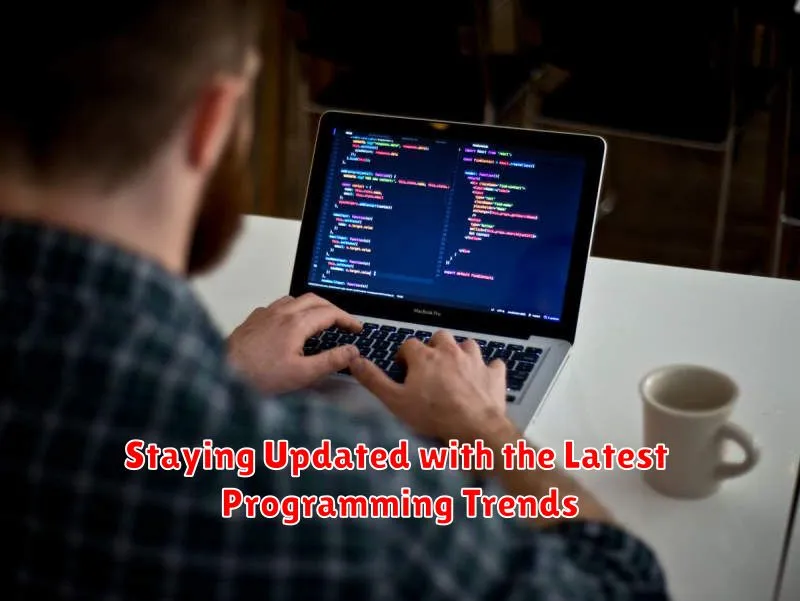
The world of programming is constantly evolving, with new languages, frameworks, and technologies emerging regularly. To stay competitive and relevant in this dynamic field, it’s crucial to stay updated with the latest trends.
Following industry blogs and publications is a great way to keep your finger on the pulse of the latest developments. Sites like TechCrunch, Hacker News, and Stack Overflow provide regular updates on new technologies, programming languages, and industry trends. Participating in online communities, such as Reddit’s r/programming or Stack Overflow forums, allows you to engage with other developers, ask questions, and learn from their experiences.
Beyond staying informed, actively experimenting with new technologies is essential for staying current. This could involve exploring new programming languages like Go or Rust, diving into the world of machine learning with Python, or learning about cutting-edge technologies like blockchain or quantum computing.
Landing Your Dream Job After Completing Your Course
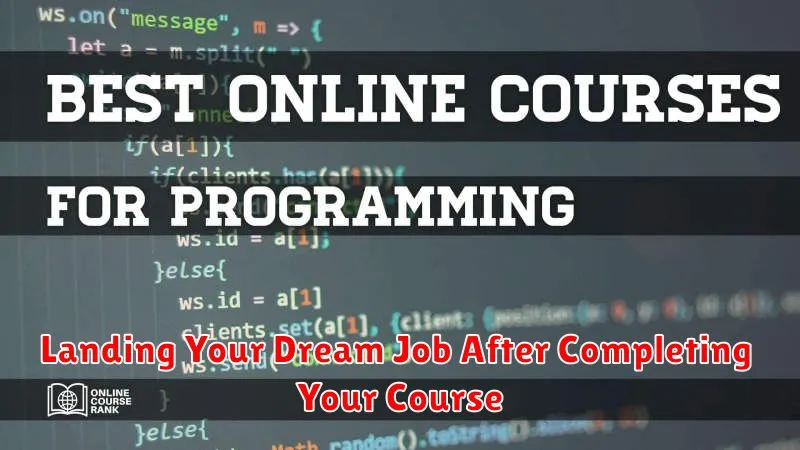
You’ve dedicated time and effort to mastering valuable programming skills through an online course. Now, it’s time to leverage that knowledge and land your dream job! Here’s a roadmap to help you navigate the exciting transition from learner to programmer:
1. Sharpen Your Skills
The first step is to ensure you’re equipped with the skills employers seek. Revisit your course material, focusing on core concepts and in-demand programming languages. Practice your skills by working on personal projects, contributing to open-source projects, or participating in coding challenges. This will not only solidify your understanding but also demonstrate your passion and commitment to continuous learning.
2. Craft a Compelling Portfolio
Your portfolio is your most powerful tool in showcasing your abilities. Include projects that demonstrate your skills, showcasing your problem-solving capabilities, creativity, and technical expertise. Think about projects that align with the roles you’re targeting. For instance, if you’re aiming for a front-end developer role, highlight projects that showcase your web design and user interface skills.
3. Tailor Your Resume and Cover Letter
Highlight your skills and experience that match the specific requirements of the job description. Use keywords from the job posting throughout your resume and cover letter. If your resume is tailored to each application, it’s more likely to be noticed by recruiters and hiring managers.
4. Network and Build Connections
Networking is crucial in the tech industry. Connect with professionals on LinkedIn, attend industry events, and participate in online communities. Don’t be afraid to reach out to people who inspire you and ask for advice or insights. Building connections can lead to job opportunities or valuable advice.
5. Prepare for Interviews
Practice your interview skills by participating in mock interviews. Prepare for common questions related to your skills, projects, and career goals. Practice explaining your projects, your thought processes, and your approach to problem-solving. This will help you communicate your skills effectively and confidently during the interview.
Remember, landing your dream job is a journey, not a destination. By constantly learning, refining your skills, and actively seeking opportunities, you’ll be well-equipped to achieve your career goals. Good luck!

